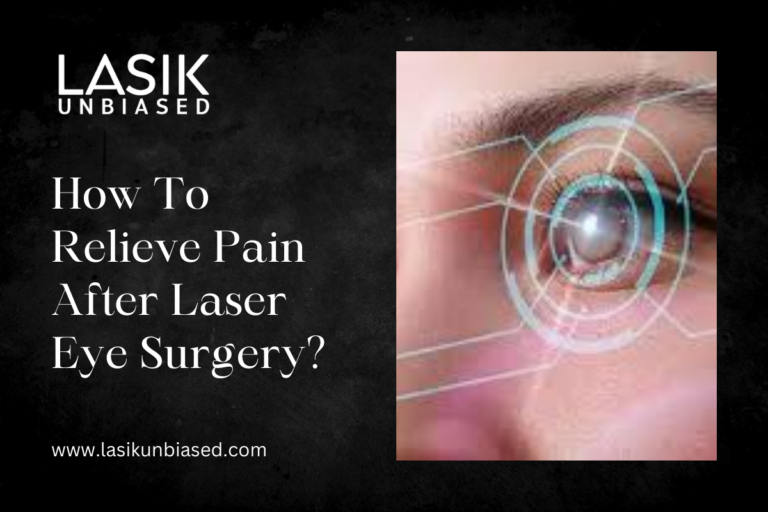Laser eye surgery offers a life-changing improvement in vision, but mild discomfort is common during healing. While most patients experience minimal pain, some may feel irritation, dryness, or a burning sensation in the first few days. Understanding how to manage this discomfort helps ensure a smooth and pain-free recovery.
Using Prescribed Eye Drops
Doctors prescribe medicated eye drops to prevent infection and reduce inflammation. Using these drops as directed keeps the eyes lubricated and helps minimize irritation. Artificial tears also play a crucial role in preventing dryness, a common cause of discomfort after laser eye surgery.
Applying Cold Compresses
Cold compresses provide immediate relief by reducing swelling and soothing irritation. A clean, chilled cloth over closed eyelids helps calm inflammation and discomfort. However, direct pressure on the eyes should be avoided to prevent disruption of the healing process.
Resting the Eyes
Adequate rest is essential for quick recovery. Limiting screen time and avoiding bright lights reduce eye strain and promote healing. Keeping the eyes closed for short periods throughout the day allows them to recover naturally. Sleeping with protective eye shields prevents accidental rubbing, which can increase irritation.
Avoiding Harsh Environments
Exposure to wind, dust, and smoke can worsen post-surgery discomfort. Staying indoors in a clean, controlled environment helps prevent irritation. Wearing sunglasses while stepping outside protects the eyes from bright sunlight and airborne particles, reducing strain and dryness.
Taking Pain Relievers if Necessary
Mild over-the-counter pain relievers, such as acetaminophen, help manage discomfort during the initial recovery phase. These medications should only be used if necessary and under the guidance of an eye doctor. Avoiding aspirin or ibuprofen is recommended, as they may increase the risk of excessive tearing or bruising.
Keeping the Eyes Hydrated
Dryness is one of the most common causes of post-surgery discomfort. Drinking plenty of water and using artificial tears regularly helps maintain eye moisture. A humidifier in the room can also prevent dry air from aggravating irritation.
When to Seek Medical Attention
Mild discomfort is normal, but severe pain, increasing redness, or worsening vision require immediate medical attention. Any sharp or prolonged pain beyond the expected healing period may indicate an infection or complication. Consulting an eye specialist ensures proper treatment and prevents further issues.
Following these simple measures, patients can minimize discomfort and promote a smooth recovery after laser eye surgery. Proper care and patience ensure the best possible vision outcomes.
Why Pain Occurs After Laser Eye Surgery
During laser eye surgery, a small flap is created in the cornea to reshape its surface. This process temporarily affects the nerve endings in the eye, leading to mild irritation and sensitivity. The eyes may feel dry or sore as they adjust to the changes. In some cases, the sensation of a foreign object in the eye may occur, but this usually subsides within a few days. While most discomfort is temporary, taking the proper precautions helps reduce pain and promote healing.
Using Medicated and Artificial Eye Drops
Eye drops play a crucial role in post-surgery care. Doctors prescribe antibiotics and anti-inflammatory drops to prevent infection and control inflammation. Using these drops as directed reduces irritation and promotes faster healing. In addition to medicated drops, preservative-free artificial tears help keep the eyes hydrated, preventing dryness and discomfort. Keeping the eyes well-lubricated minimizes the risk of excessive irritation and improves overall comfort.
Limiting Screen Time and Bright Light Exposure
Excessive screen time can strain the eyes and increase discomfort after laser eye surgery. Avoiding digital screens, such as smartphones, computers, and televisions, for the first 24 to 48 hours allows the eyes to rest. Reading small text or using bright screens may cause dryness and irritation, prolonging healing. Wearing sunglasses, even indoors if necessary, helps reduce sensitivity to bright lights.
Wearing Protective Eyewear
Protective eyewear prevents accidental rubbing or exposure to irritants. Doctors often recommend wearing eye shields while sleeping to avoid unintentional pressure on the eyes. Sunglasses with UV protection help block harsh sunlight, reducing light sensitivity and minimizing discomfort. Protective glasses are handy when stepping outside, shielding the eyes from wind, dust, and airborne particles.
Maintaining a Restful Environment
Creating a comfortable and relaxing environment supports healing. Resting in a dimly lit room reduces eye strain while avoiding bright overhead lights prevents unnecessary discomfort. Playing soft music or listening to audiobooks provides entertainment without requiring visual focus. Keeping the eyes closed for short periods throughout the day accelerates recovery and minimizes irritation.
Applying Cold Compresses for Relief
Cold compresses provide soothing relief for post-surgery discomfort. A clean, damp cloth chilled in the refrigerator can be gently placed over closed eyelids to reduce swelling and inflammation. This method offers immediate comfort without putting pressure on the eyes. However, direct ice application should be avoided, as extreme cold may cause further irritation.
Avoiding Irritants and Harsh Environments
Environmental factors like smoke, dust, and wind can worsen post-surgery discomfort. Staying indoors in a clean space helps prevent exposure to airborne particles that may irritate the eyes. If going outside is necessary, wearing wraparound sunglasses provides extra protection. Dry air from air conditioners or heaters can also contribute to eye dryness, so using a humidifier keeps indoor air moist and comfortable.
Following a Proper Sleep Schedule
Adequate sleep plays a vital role in recovery. The body heals most efficiently during rest, making it essential to get enough sleep after laser eye surgery. Sleeping in a slightly elevated position reduces swelling and discomfort. Using an eye shield prevents accidental rubbing, ensuring a safer healing process.
Hydrating and Eating a Nutrient-Rich Diet
Proper hydration supports eye health and overall recovery. Drinking plenty of water keeps the eyes moisturized and prevents dryness. Consuming foods rich in vitamins A, C, and E and omega-3 fatty acids promotes healing and reduces inflammation. Leafy greens, citrus fruits, nuts, and fish contribute to better eye health. Avoiding alcohol and caffeine prevents dehydration, which can increase post-surgery discomfort.


